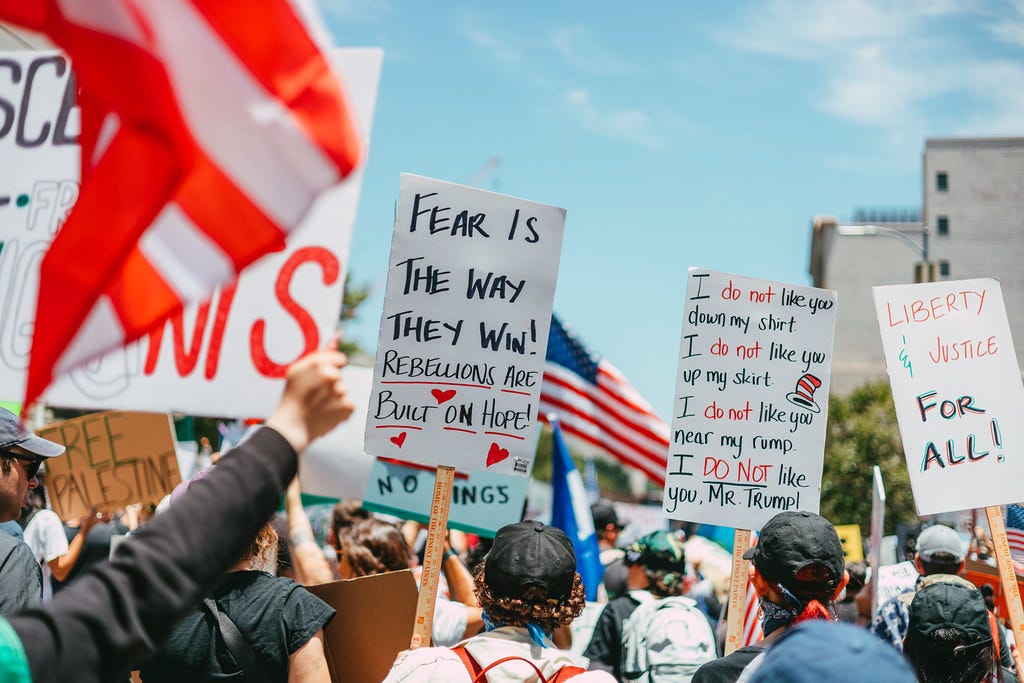Questioning Institutional Legitimacy and Its Backlash
How to Regain Trust in the Structures We've Created
What if I’m looking at my house and dissatisfied with the colors on the walls? I did not choose them. They were here before me. And what if instead of going to Sherwin-Williams to pick out the paints I like and hiring someone to paint my walls, I got so angry and decided that instead of changing the color of my walls, I would burn the house down?
Suppose that the reason I went to that extreme was someone else—perhaps a contractor—convinced me that it was the right thing to do. “You can’t live in a house like that. You didn’t pick the color. You had no choice in the process. Just burn it all down and start all over,” the contractor declared.
So, I do it. And who can help me build a new home? Well, the contractor is waiting. But as we start to plan and rebuild, he designs something I don’t like. I don’t have a say in the process. The final product is worse than before, and I get stuck with a huge bill. I get angry that I let this person talk me into it and learn to distrust all contractors. Now, I’m left with nothing. No house. No walls to paint.
This is where we are. We are living in a country that we’ve set as a dumpster fire floating down a flooded road. We’ve created a tipping point when we’ve questioned what our government can and cannot do for us. All this was a result of a neoliberal, capitalist strategies to keep money and power in the hands of a few. For example, policies like Reagan-era tax reforms or Citizens United, which held that corporations and unions have the same First Amendment rights as individuals.
And this started many years ago during Reagan’s campaign, when we were told government was “bad” by the same people running for government offices. During his inaugural address in 1981, he famously said, “Government is not the solution to our problem; government is the problem.” Many people did not see the irony then, and they still don’t see the irony now. This is what political philosopher Jürgen Habermas calls a “legitimation crisis.” This happens when a society's dominant institutions fail to maintain public belief in their legitimacy, leading to social and political instability. But what happens when billionaires and those in government power are the ones who created this crisis through the use of propaganda?

Their propaganda is created to cast doubts on the legitimacy of institutions and authority so that power could be handed to a select few individuals—those controlling most of the country’s wealth. The purpose of the institution of government, both local and federal, is to help people do what they cannot do as individuals or in the private sector. We need good roads, electric grids, sewage systems, and ways to distribute resources that are democratically decided. We also need laws to help us deal with problems so the system functions in an orderly way. They don’t seek to regulate ethics, but only to serve to protect basic rights.
But what happens when trust in these institutions is called into question? What happens when someone says that government—especially “big government”—wants to regulate your happiness? Eventually, some people will agree, because who wants others to interfere in one’s business? So, they give these politicians power. This power deregulates corporations so they can pollute our water resources—water that everyone drinks—and take away consumer protections. Eventually, they allow the government to take away more rights, thinking that people are somehow being protected when they are not. This came in the form of voter suppression laws, surveillance programs, or anti-protest legislation. The gaslighting, chaos, and endless noise all serve to distract us from who we should truly doubt.1
But then things backfire. Eventually, people call into question the legitimacy and authority of those who originally caused the doubts. This has been seen in the “No Kings” day protest and will continue as more and more people feel discontent with the ones who told them one thing and are now telling them another. When fair elections are called “rigged,” when an insurrection is called a “peaceful protest,” when most news outlets are called “fake news,” what prevents things from going the other way? What happens when people decide to storm the U.S. Capitol again or violently demonstrate or call for a real revolution? To be clear, I’m not encouraging any of these acts and seek only peaceful change, but when doubt is cast on the legitimacy of government where there isn’t any, it eventually results in some kind of blowback.
What can we do when those in power cast doubts on the legitimacy of an institution?
1. Pay Attention to the Narrative Behind the Power
Every claim to power is supported by a narrative—of law, consent, or truth. Learn to analyze the stories political leaders, media, and institutions tell: Are they grounded in evidence? Do they appeal to fear, identity, or justice? What is the intention of the message and does it work?
Next time you hear a political claim, ask:
“What authority does this appeal to?”
“Who benefits if I believe this?”
“Does it align with observable reality?”
2. Build Relationships of Trust Where Trust Has Collapsed
When national institutions feel broken, shift your focus to local action and relationships. Join or create community efforts that reflect transparency, accountability, and mutual respect. These small pockets can restore trust and legitimacy from the ground up.
Attend a city council meeting, school board, or community organizing session.
Invite diverse perspectives into conversation—not to win, but to understand.
Share reliable, fact-checked sources within your circle.
3. Practice and Promote Integrity of Truth
One of the deepest cracks in our legitimation crisis is the breakdown of shared truth. Become a trustworthy voice. This means verifying before sharing, correcting misinformation, and cultivating intellectual humility. Truth isn't partisan—it’s practical. As we learned during the pandemic, false claims can hurt people.
Choose one area (climate, elections, health) to follow through credible sources.
Fact-check posts before sharing. Model curiosity, not certainty.
Ask: What would it take for me to change my mind?
Of course, there are legitimate cases to lose trust in the institutions we hold dear. But when there are no practical concerns, we should be wary of the information given to us. Are immigrants taking our jobs? Are trans people forcing others to be trans? Are our Second Amendment rights really being taken away? Are people being denied the right to say “Christmas”?
People’s fears—fears that have a purposeful basis—have been used against them so that power could be taken away. When people are mobilized together, they find their power is unmatched. But when they are splintered, the few can amass power for themselves by leveraging the populist.
Conversation Turns the Tide
When we have constructive conversation with others—especially when they differ in beliefs, opinions, and background—our trust in others can grow. Communities and institutions are built on this foundation, and the only way to regain trust is to form relationships of deep understanding.
I must admit that being in deep conversation is difficult. Often, I don’t do it as well as I write about it. It is a practice born out of aspiration for unity, rather than division—to put the power back into the hands of people rather than deferring it to those who are not looking out for our best interests.
If you’ve enjoyed this work and want to continue to see the fruit of constructive conversation, please consider my most recent book, Jesus and Buddha Talk: About Desire, Suffering, and Happiness. It is available through my website (here) and wherever books are sold. For a limited time, you can receive a signed copy with an ensō ink painting from me
.
All my books were sold out on Monday, which was launch day, and I’ve ordered more books to sign from the publisher.
A special shout out to Sophia W., my intern for this summer. Sophia helped me edit this article and assisted me in mailing out all my books for the launch. Thank you all for your support. I am deeply honored.
Voter Suppression Laws
Florida Senate Bill 90 (2021) curtailed access to mail-in voting, restricted third-party organizations, and reduced drop-box locations—critics and the Brennan Center have labeled it a voter suppression measure time.com+10acleddata.com+10prismreports.org+10en.wikipedia.org+3en.wikipedia.org+3brennancenter.org+3.
Georgia’s Election Integrity Act of 2021 (SB 202) added stricter ID for absentee ballots, limited drop boxes, penalized giving food/water to voters, and drew scrutiny from the DOJ and civil rights groups.
The Brennan Center reports that following the 2013 Shelby County v. Holder, over 361 restrictive voting bills were introduced in 47 states, featuring restrictions like stricter ID requirements, early voting cuts, and aggressive voter roll purges aclu.org+15en.wikipedia.org+15brennancenter.org+15.
Crystal Mason’s case in Texas highlights felony charges for casting a provisional ballot while on supervised release—indicative of severe voter-suppression enforcement newyorker.com+1them.us+1.
Surveillance Programs
Modern protest surveillance: Many police departments recorded and publicly released videos from Black Lives Matter protests—raising serious First Amendment and privacy concerns columbialawreview.org.
Anti‑protest Legislation, Notable State Laws:
Tennessee (2020) law categorizes obstructing sidewalks/streets as a felony punishable by up to a year in jail—even peaceful protestors can be criminalized icnl.org.
Louisiana (2018) makes trespassing near a pipeline, even for protest, punishable by up to five years in prison newyorker.com+15icnl.org+15apnews.com+15.
Florida (2021) passed a law expanding the felony definition of “riot” to include mere participation in a crowd deemed dangerous—even absent violence icnl.org.
According to the International Center for Not-for-Profit Law, 40+ states have introduced or passed anti‑protest bills since 2017, many imposing harsh penalties for peaceful assembly icnl.org+1acleddata.com+1.
Texas Senate Bill 2972 (2025) limits student protests at state universities—banning camping, disguises, amplified sound, and restricting times







Yes, we absolutely are in the biggest Big Govt era of our lifetimes. Very insightful advice--'track the narrative behind' the policy or campaign slogan. That is indeed where it all starts.